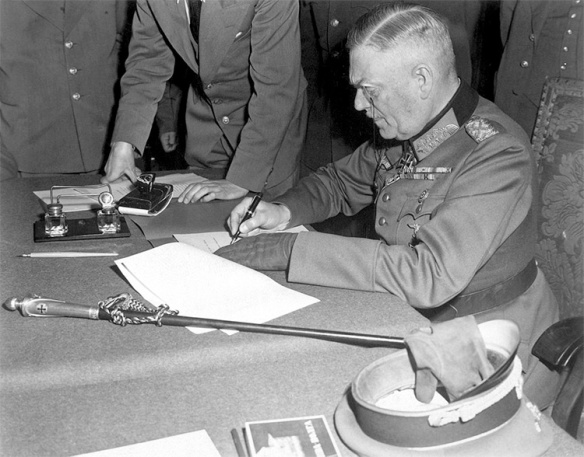
Field Marshal Wilhelm Keitel signing the ratified surrender terms for the German military in Berlin.
The Allies were very clear. It would be “unconditional surrender.” Such a surrender is rare in modern times. In the Civil War, General Ulysses S. Grant had insisted on it but had been generous with Confederate prisoners. Following the surrender at Appomattox Court House, they were given Union rations and many were permitted to keep horses or mules for spring plowing. Confederate officers were allowed to keep their horses and sidearms.
In World War II, the concept was raised at the Casablanca conference in January 1943. President Roosevelt announced the idea at a press conference there. Winston Churchill later told Parliament that he knew nothing about the call for unconditional surrender until the president had spoken to the press. Later, Churchill would concede that he had discussed it with the president beforehand.
Throughout the war, some American and British observers had commented that “unconditional surrender” would prolong the war. Nazi propaganda chief Joseph Goebbels used the issue to frighten Germans about the slavery that lay ahead for them if Germany ever accepted it.
Shadows of the Past World War
Why, then, was the United States so insistent on it? Part of the answer may lie with an old general from an old war. In 1931, General of the Armies John J. Pershing, who had led the American Expeditionary Force in World War I, published his memoirs. Not long after the Treaty of Versailles was signed, extremist parties in Germany were decrying the “stab in the back” by German politicians. These parties—notably the newly formed Nazi Party—were claiming that Germany had not lost World War I at all, but that the German military had been betrayed.
Pershing was certainly aware of this when he looked back on the mistakes of World War I and its aftermath:
“Instead of requiring the German forces to retire at once, leaving material, arms, and equipment behind, the Armistice terms [of 1918] permitted them to march back to their homeland with colors flying and bands playing, posing as the victims of political conditions. If unconditional surrender had been demanded, the Germans would, without doubt, have been compelled to yield, and their troops would have returned to Germany without arms, virtually as paroled prisoners of war. The surrender of the German armies would have been an advantage to the Allies in the enforcement of peace terms and would have been a greater deterrent against possible future German aggression.”
Germany Accepts Unconditional Surrender
The United States was not going to make the same mistake again. So it came about that it was the German military that surrendered unconditionally in World War II. Doenitz, who had led the German navy, was the official government head who authorized the surrender.